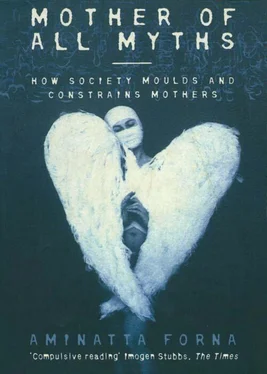Breaking the rules resulted in indiscipline, a ruined child or even death as the eminent paediatrician remarked in speeches which were sometimes little more than rants against the failings of mothers: ‘much wastage of infant life in our midst is due to self-indulgence and shirking of duties.’ 3 Mothers frustrated Sir Frederick who would have much preferred that the care of infants was entirely taken over by specially trained nurses.
Despite a firm belief in gender roles and the place of women, Truby King did not appear to believe in the idea of maternal instinct. He considered motherhood a calling for which women had to be trained, because left to their own devices they would ruin the lives of their children. The closest he ever came to recognizing any kind of natural emotions was a reference to the additional advantage of promoting bonds between mother and child when breastfeeding. In general he regarded mothers as inadequate, ignorant and lacking in discipline. A mother was all that stood between him and the creation of the perfect child.
When Truby King died in 1938 in New Zealand, his long and distinguished career had earned him international recognition. His ideas lived on until the war years and just beyond; many of today’s fifty-, sixty- and seventy-year-olds were Truby King babies, and many grandmothers still regard silence, solitude and timed feeds as the definition of a good baby.
The aftermath of the Second World War produced a new set of circumstances and a different agenda. Women, too, were ready to give up this gruelling and often heartbreaking regime. By the 1950s, Truby King’s ideas were swept aside as a new era of motherhood rolled in.
No other theorist had as powerful and as radical an effect on thinking about motherhood as Edward John Mostyn Bowlby who died in 1990 and whose ideas on ‘attachment’ and the effects of maternal deprivation form the cornerstone of modern maternal ideology. Unlike the other great ‘gurus’, Bowlby was not so much a popular writer as an academic and theorist. Nevertheless, his first book. Child Care and the Growth of Love, sold hundreds of thousands of copies around the world. It was a seminal work.
Bowlby came from somewhat elevated beginnings. He was distinctly upper class, the heir to a baronet who was raised by a nanny, followed by boarding-school and Cambridge. As with Freud, there has been speculation over whether it was Bowlby’s early experience of being raised by a somewhat distant mother, who preferred to leave the children’s care to a hired nanny, that established Bowlby’s later fascination with mother-child relationships.
The 1940s were a critical period for Europe and for Bowlby, and most of his ideas were the fruit of this thoroughly atypical period. The Second World War bore witness to the large-scale evacuation of children from the cities to the relative safety of the countryside and sometimes abroad to other countries, such as Canada. Children were separated from their families for months, even years, often boarded with strangers and lived unfamiliar lives.
War changed the lives of women. In the previous decades women’s work outside the home had been declining steadily, but conscription and the call to arms reversed the trend sharply. Women staffed the munitions factories, went to the countryside to work the fields and bring in the harvests, volunteered as nurses, raised funds for the war effort and joined the Wrens. For the first (and last) time in the history of the country, the government both condoned women working outside the home and provided extensive, state-funded nursery and daycare so that they could do so.
Britain and the world had undergone massive social shifts, the long-term effects of which remained unclear. Six years of fighting a war had resulted in population shifts and decimated communities in the countryside and the city. Eventually, terraced homes, with their narrow streets and facing backyards, would be pulled down and replaced by modern tower blocks and prefabs. While that was still to come, the social effects were already felt, particularly by mothers who lost their support networks of kin and neighbours in one fell swoop. Women from the upper classes no longer had servants to administer to their children’s needs and for the first time became wholly responsible for their own offspring.
This is the context within which Bowlby produced his studies of institutionalized childcare and his twin theories of the instinctual bond between mother and child which should never be broken, and the effect upon children if the bond is broken.
Bowlby had been following with interest the work of Rene Spitz who had made a study of institutionalized babies. Spitz’s findings then mirror the situation documented in state orphanages in China in the 1990s: children deprived of human contact and isolated for long periods will fail to thrive, rocking themselves back and forth, hitting their heads repeatedly against the sides of their cot, or staring in dull passivity for hours on end. Bowlby carried out his own study of forty-four child thieves, noting that seventeen of them had been separated from their mothers for a period as infants. Struck by this fact he ascribed their later problems to this single event, famously writing: ‘changes of mother-figure can have very destructive effects in producing the development of an affectionless psychopathic character given to persistent juvenile conduct.’ 4
In 1950 the World Health Organization commissioned a study from Bowlby on children orphaned or separated from their parents as a result of the war in France, the Netherlands, Sweden and Switzerland. The report, which was published in 1951, immediately caused an international sensation. In its pages Bowlby condemned the cruelty of all institutional care, arguing that children needed and were entitled to the love and care of a mother. Anything less amounted to ‘maternal deprivation’, the effects of which would be seared on the child’s psyche eternally and irrevocably.
Bowlby desperately wanted to close down or at least reform the system of large orphanages which were incapable of meeting the needs of individual children. In this he succeeded and he can be thanked for current social welfare policies which try to place a child with foster parents or in a family environment instead of in children’s homes. But for women, for mothers, Bowlby’s views, his high ideals and exacting standards as well as the way his work has since been interpreted, spelled disaster.
In Child Care and the Growth of Love, Bowlby declares that the mental health of a child absolutely requires ‘a warm, intimate, and continuous relationship with his mother…in which both find satisfaction and enjoyment’. 5 No small order by anyone’s standards, but that is the very least of it. He continues: ‘we must recognise that leaving any child of under three years of age is a major operation only to be undertaken for sufficient and good reason.’ 6
In Bowlby’s terms, not only should a mother be her child’s constant companion, but she should find her fulfilment in the role, too. If she fails to do so, the whole exercise is useless. ‘The mother needs to feel an expansion of her own personality in the personality of the child’ – note needs to feel. ‘The provision of mothering’, he argued, ‘cannot be considered in terms of hours per day, but only in terms of the enjoyment of each other’s company which mother and child obtain.’ Any woman who hesitated received admonishment in the very next paragraph. ‘The provision of constant attention day and night, seven days a week and 365 days in the year, is possible only for a woman who derives profound satisfaction from seeing her child grow from babyhood, through the many phases of childhood, to become an independent man or woman, and knows it is her care which has made this possible.’ 7 Of course, there weren’t, and aren’t, many women who would have dared to declare themselves anything less than absolutely committed to the healthy progress of their children.
Читать дальше












